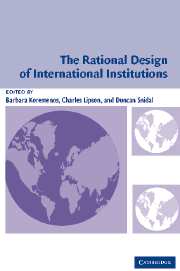Book contents
- Frontmatter
- Contents
- Contributors
- Abstracts
- Title Page
- The Rational Design of International Institutions
- Trust Building, Trust Breaking: The Dilemma of NATO Enlargement
- The Optimal Design of International Trade Institutions: Uncertainty and Escape
- Most-Favored-Nation Clauses and Clustered Negotiations
- Situation Structure and Institutional Design: Reciprocity, Coercion, and Exchange
- Private Justice in a Global Economy: From Litigation to Arbitration
- Multilateralizing Trade and Payments in Postwar Europe
- The Institutional Features of the Prisoners of War Treaties
- Institutions for Flying: How States Built a Market in International Aviation Services
- Driving with the Rearview Mirror: On the Rational Science of Institutional Design
- Rational Design: Looking Back to Move Forward
- References
Trust Building, Trust Breaking: The Dilemma of NATO Enlargement
Published online by Cambridge University Press: 28 October 2009
- Frontmatter
- Contents
- Contributors
- Abstracts
- Title Page
- The Rational Design of International Institutions
- Trust Building, Trust Breaking: The Dilemma of NATO Enlargement
- The Optimal Design of International Trade Institutions: Uncertainty and Escape
- Most-Favored-Nation Clauses and Clustered Negotiations
- Situation Structure and Institutional Design: Reciprocity, Coercion, and Exchange
- Private Justice in a Global Economy: From Litigation to Arbitration
- Multilateralizing Trade and Payments in Postwar Europe
- The Institutional Features of the Prisoners of War Treaties
- Institutions for Flying: How States Built a Market in International Aviation Services
- Driving with the Rearview Mirror: On the Rational Science of Institutional Design
- Rational Design: Looking Back to Move Forward
- References
Summary
What determines the price of membership in an international institution? Barbara Koremenos, Charles Lipson, and Duncan Snidal hypothesize that uncertainty about the preferences of other states will increase that price, as stated in Rational Design conjecture M2, restrictive MEMBERSHIP will increase with UNCERTAINTY ABOUT PREFERENCES. When states are uncertain about the motivations of other states, they will demand costly signals of reassurance before being willing to cooperate fully. In a multilateral context, this may take the form of an institution with a significant barrier to entry, a price of admission. The price of admission serves to separate states who are seriously interested in cooperation from those who have more exploitative motivations. More cooperative states will be willing to pay the price, and this will reveal their cooperative nature to others, facilitating cooperation. Less cooperative states will not be willing to pay the price, and this too will reveal their type, leading others to cooperate less with them.
The case of NATO enlargement is a perfect example of this logic at work. In the recent enlargement round, NATO established an extensive set of criteria to determine who would be admitted and who would not. The criteria included democratization, civilian control over the military, and the resolution of all border disputes and frictions with neighbors over ethnic minority issues. These hurdles served to separate the more cooperative states from the rest, enabling NATO to admit and cooperate more intensively with those states with proven cooperative credentials.
- Type
- Chapter
- Information
- The Rational Design of International Institutions , pp. 41 - 68Publisher: Cambridge University PressPrint publication year: 2003

